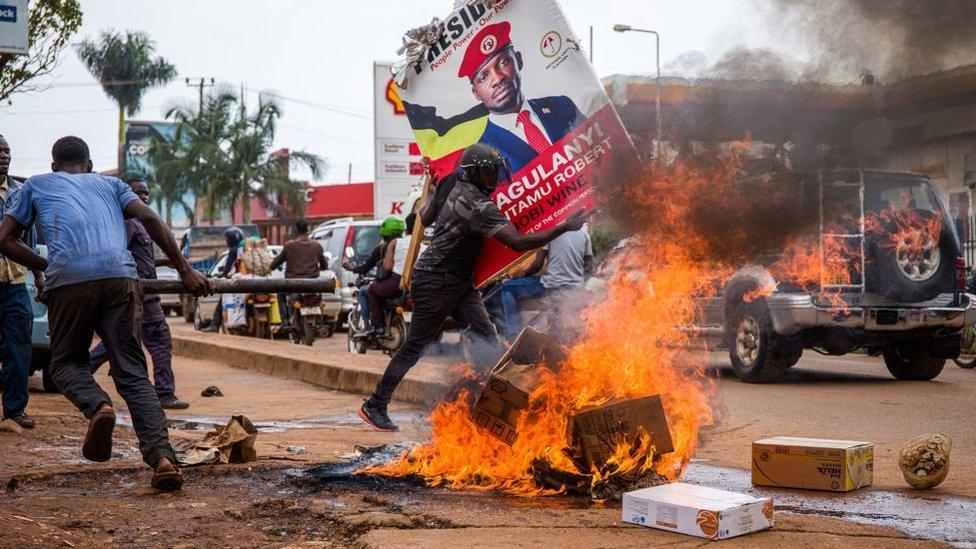Bobi Wine protests: Shoot to kill defended by Uganda minister
- Published

Protesters burnt tyres and piles of rubbish in the capital, Kampala, earlier this week
Police in Uganda have a right to shoot protesters dead if they "reach a certain level of violence", Security Minister Elly Tumwine has said.
Clashes with police sparked by the arrest of presidential candidate and former pop star Bobi Wine have left at least 28 people dead since Wednesday.
He was later charged with spreading coronavirus at a campaign rally.
But human rights groups say the charge is a pretext to suppress opposition ahead of elections due in January.
The musician, whose real name is Robert Kyagulanyi, is among 11 candidates challenging President Yoweri Museveni, who has been in power since 1986.
The singer was released on bail on Friday after a court appearance.
His arrest two days earlier outraged his supporters. Groups of young people set up barricades, burnt tyres and piles of rubbish in the streets of the capital, Kampala, and other towns.
Security forces responded by firing tear gas and live bullets to disperse people.
Pointing to the fact that 11 security personnel had been injured Mr Tumwine told reporters that "police have a right to shoot you and kill you if you reach a certain level of violence".
"Can I repeat? Police have a right to shoot you and you die for nothing.... do it at your own risk."
In a statement, police said 28 people had died during protests on Wednesday and Thursday, but the AP news agency quotes a police pathologist and the head of police health services as saying they had counted 37 bodies by Thursday morning.
Singer and president battle for youth vote
In June Bobi Wine vowed to defy a ban on campaign rallies during the pandemic. He accused President Museveni of "fearing the people".
Uganda government spokesman Don Wanyama told the BBC that officers could not "just fold their arms and allow anarchy to happen".
He also said President Museveni had "stuck by the rules that were issued by the electoral commission and the ministry of health".
Human Rights Watch says it is clear that the Ugandan authorities are using Covid-19 guidelines to repress opposition and that the governing party has held large campaign events.

Uganda shocked by violence
Patience Atuhaire, BBC News, Kampala
Bobi Wine seemed quite contemplative as he listened from the dock while the charges were read. After two days in detention, his lawyers were finally granted access to him.
He was charged for contravention of the public health act, an offence that attracts up to seven years in prison.
The court building was surrounded by heavily armed security personnel. The aggressive police response to this week's protests has shocked the country.
It is the worst violence to erupt on the streets of Uganda since Bobi Wine was nominated as a presidential candidate.

Security was increased following the unrest. Officials say soldiers will be placed at major roads leading into Kampala and a 21:00 curfew will be strictly enforced.
Over more than three decades in power, President Museveni has often been accused of using violence against political rivals. He has always denied such charges.